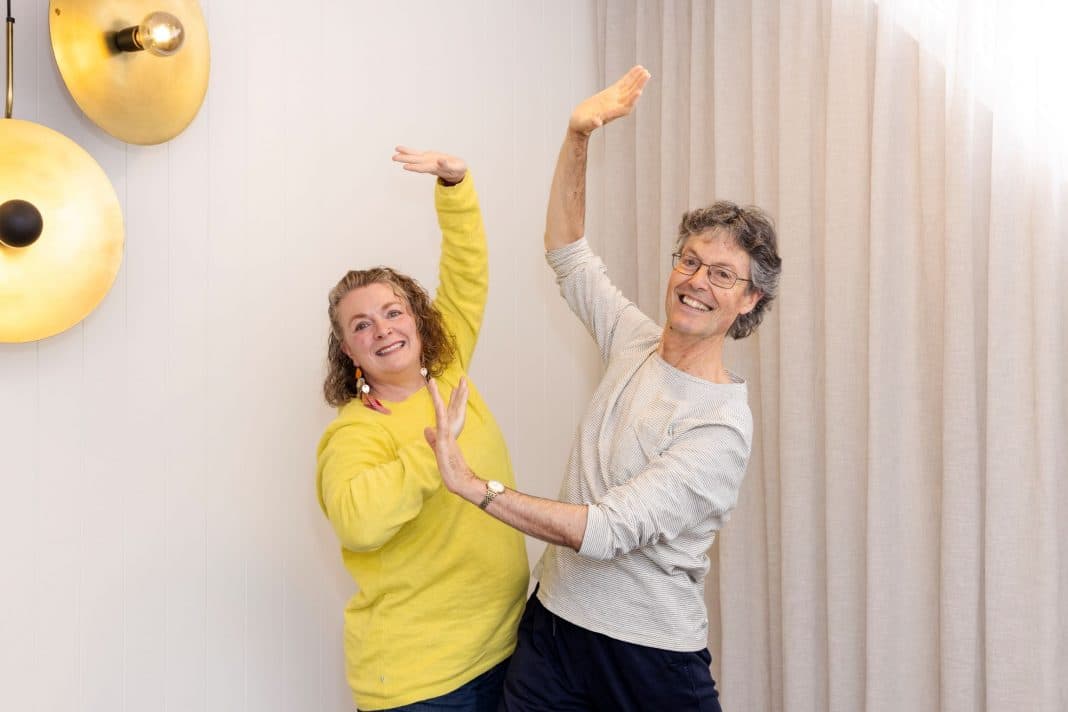On Tuesday mornings, Weston Neighbourhood Hall comes bursting to life with the sounds of golden age Hollywood showtunes, laughter and love as the Sparks dance class takes place. Designed for people living with dementia and their carers to take together, the program is conducted by Zest: Dance for Wellbeing with the support of Dementia Australia and the legacy of a generous Canberran.
“She would want to give back in a meaningful way, she wouldn’t want me to just say ‘here, have $2’ and walk away. She would want to make a difference,” says Merle Ketley.
Merle’s mother Dilys Ketley passed away in March last year, noting three charities in her will she wanted money from her estate to be donated to. Not dictating specific amounts, Merle was left to decide how to divide the funds. She spoke to the charities and Dementia Australia mentioned they were having trouble restarting their dance program after the Covid restrictions and lockdowns.
“My dad had Alzheimer’s and she used to get a lot of support from Dementia Australia … Somebody would come and take him out once a week for coffee and other things for some respite for her and I think she really valued that, so she wanted to give back.”
Merle says her English mother also had dementia; when she was younger, she used to be in the BBC Holiday Fellowship and loved theatre and dance. After a foot reconstruction, she joined the Old Time Tappers, so for Merle giving to the program was a no brainer.
Sparks is one of the 12 classes run by the four members of Zest: Dance for Wellbeing across the ACT. Philip Piggin, one of the members of the organisation, comes from an education background, and had been involved with dances for variously abled people when he heard about a program designed for people with Parkinson’s. Although it originated in around 2000 in the UK and US, it took more than a decade to land in Australia, coming to Canberra in 2013. Philip undertook a short course and, wanting to know more, was awarded a Churchill Fellowship to travel abroad to study it further.
“It was looking at programs for people with Parkinson’s but also people with dementia, which was a growing phenomena worldwide,” says Philip.
Returning to Canberra after a three-month course in mid-2015 ready to “conquer the world”, he applied to ACT Health for a three-year dance program. At Belconnen Arts Centre, they held classes for people with three different conditions – dementia, Parkinson’s and MS. Philip says it was extraordinary to realise that the health sector saw the big picture of health.
“We really see the dance program ticks those three boxes – a workout for the body, it’s a workout for the brain, and really important for that social stimulation,” he says.
Then Covid hit and the three years of in-person classes came to an end. While they continued classes via Zoom, Philip says the dementia dance class was the only one they couldn’t really get happening again due to the fragility of participants and changes at Dementia ACT.
“I was in constant dialogue with them, they were very supportive, but they just really needed a gift from the gods to come and make this happen,” he says.
With the $10,000 donated from Dilys’s estate and an additional $5,000 donated by Merle, the program should be able to continue running for a few years. Their first class back had nine couples attend; each class is delivered for both the person with dementia and their carer or carers.
Everyone begins seated on chairs in a circle, which Philip says helps create a feeling of inclusivity, accessibility and equality. Throughout the session, instructors go through a range of movements, starting with slow gentle breathing to wake the body before progressing to more active moves.
Engaging the mind as well as the body, partners are encouraged to face each other and mirror moves made by the instructor. Philip says they will progress to more detailed hand moves as the class evolves throughout the term.
“Usually spend a couple of weeks on an activity, maybe adding a little bit more complexity to it each week and, just as importantly, keeping the class fun, engaging and challenging for the carer and for the person with dementia.”
They have space to accommodate up to 12 couples per class.
“We want to keep it at a level that enables some connection with people and once it gets much bigger than that we start to lose that personal intimacy,” says Philip.
He hopes that with enough interest, they will be able to start a northside class, making the opportunity more accessible to more people.
The social side is an important part of the program. For the people with dementia and their carers, it is an opportunity for them to step out of the carer/patient role and enjoy their time together. Philip says the program is an opportunity for people to connect in a safe, accepting environment, and comes knowing everyone has come with lived experience of dementia.
“Sad things happen but good things can come out of it. There’s a whole lot more that you can give to other people when something is not so happy for you, then you can live that joy again through other people,” smiles Merle.
To find out more about the Sparks dance program for people living with dementia, visit zestdwb.blogspot.com
To find more support if you or are loved one are living with dementia, visit dementia.org.au
Canberra Daily is keen to hear from you about a story idea in the Canberra and surrounding region. Click here to submit a news tip.



